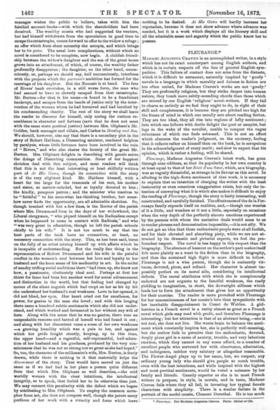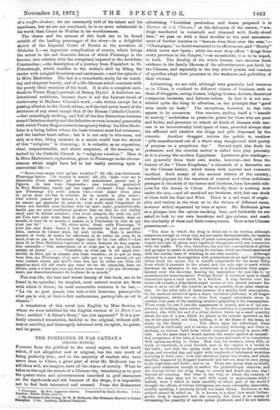FLEURANGE. , MADAME AUGUSTUS CRAVEN is an accomplished writer, in a
style which has not its exact counterpart among English authors, and which is in certain respects off the line of general English sym- pathies. This failure of contact does not arise from the distaste, which it is difficult to surmount, naturally inspired by ' goody ' novels in a language in which morality and dulness in fiction are too often united, for Madame Craven's works are not 'goody.' They are profoundly religions, but they strike deeper into human nature, they touch more subtly-sounding chords than those which are stirred by our English ' religious ' novel-writers. If they fail to charm so entirely as we feel they ought to do, in right of their skill and completeness, it is because they are pitched too high for the frame of mind in which one usually sets about reading fiction. They are too ideal, they all rise into regions of lofty sentiment ; into which one follows with docile delight the poet or essayist, but lags in the wake of the novelist, unable to conquer the vague reluctance of which one feels ashamed. This is not an effect which obscures the reader's judgment, on the contrary, feeling that it reflects rather on himself than on the book, he is scrupulous in his acknowledgment of every merit ; and slow to expect that his opinion, which is rather a feeling, will be shared.
Fleurange, Madame Augustus Craven's latest work, has gone through nine editions, so that its popularity in her own country is at least equal to that of her Recit d'une Soeur, which, ass biography, was as vaguely distasteful, as strange in its flavour as this novel. In alluding to the high-flown sentiment of that work, it is necessary to explain that no intention of charging the writer with the least insincerity or even conscious exaggeration exists, but only the in- tention of conveying what it is which also makes it difficult to enjoy the reading of Fleurange, though the story is fairly interesting, well constructed, and carefully finished. The effusiveness of the de la Fer- ronays family expends itself on realities, and,—though one wearies of it a little, and wonders at it not a little, especially on occasions when the very depth of the perfectly sincere emotions experienced by the persons with whom the narrative deals would seem to us to render phrases and demonstration impossible,—it is not silly. We do not get an idea that those enthusiastic people were at all foolish, and for their elevated and absorbing piety, while we are not at- tracted by its dramatic and pictorial aspects, we feel the pro- foundest respect. The novel is lees happy in this respect than the biography. The absence of humour on the author's part makes itself felt more plainly as a want in the fiction than in the biography, and thus the sustained high flight is more difficult to follow. Fleurange is not a wise person, though she is eminently vir- tuous, devoted, pious, and refined. Her character is almost im- possibly perfect on its moral side, considering its intellectual defects. The moral attributes with which she is conspicuously endowed are not cognate to the fanciful weakness, the ready yielding to imagination, in short, the downright silliness which leads her to form the attachment that gives her an opportunity for their exercise. The reader is more provoked with Fleurange for her unconsciousness of her cousin's love than sympathetic with her inevitable disappointment in Count de Walden. A girl- heroine in a French novel is a rarity almost as great as a French novel which girls may read with profit, and therefore Fleurange is interesting ; but her attraction is that of an abstract being,—she is not real, she does not live. She wants brain to balance the senti- ment which constantly inspires her, she is perfectly well-meaning, but the author fails to perceive that the enthusiastic, devoted, deeply pious girl is a cause of anxiety, trouble, and very laborious exertion, which they cannot in any sense afford, to a number of excellent people who surround her with observance, admiration, and indulgence, neither very salutary or altogether reasonable. The Flower-Angel plays up to her name, but, we suspect, any ordinary young lady who should give people so much trouble, even with the best intentions, and while inspired with the highest and most poetical sentiments, would be voted a nuisance by her family and friends. greatly superior as she is to most French writers in purpose, in style, in morals, and in taste, Madame Craven fails where they all fail, in investing her typical female characters with simplicity. There is a similar failure in the portrait of the model cousin, Clement Dornthal. He is too much • Fleurange. Par Madame Augustus Craven. Paris: Didift* et OA of a souffre-douleur; we are constantly told of hie talent and his manliness, but we are not convinced, he is no more substantial in his worth than Count de Walden in his worthlessness.
The charm and the success of this book are to be found outside of the leading personages of the story—in a delightful sketch of the Imperial Court of Russia at the accession of Nicholas L—an ingenious complication of events, which brings the actors in the sad domestic drama of which Fleurange is the heroine, into relation with the conspiracy imputed to the Archduke Constantine ;—the description of a journey from Frankfort to St. Peterabargh, which testifies to the writer's skill by filling the reader with mingled dreariness and excitement, —and the episode o' la Mere Madeleine. The last is a remarkable study for its touch- ing and eloquent beauty, and of a life-likeness which contrasts with the purely ideal creations of the book. It is also a complete anti- thesis to Victor Hugo's portrait of Bishop Myriel. A doubtless un- intentional antithesis, because there is not the faintest touch of controversy in Madame Craven's work ;—she writes, except for a passing allusion to the Greek schism, as if she had never heard of the existence of any creed except that of the Roman Catholic Church; —but exceedingly striking, and full of the fine distinction between sound Christian charity and the defective or even immoral generosity with which Victor Hugo invest/3 his im aginary bishop. La Mere Made- leine is a being before whom the least reverent must feel reverence, and the hardest heart soften ; but it is not only in this sense, not only as a true, living creature in a mimic world that the sketch of this "religious" is charming ; it is valuable as an exposition, clear, unquestionable, and above suspicion, of the meaning at- tached by the Catholic Church to "religions vocation." Here is la Mere Madeleine's explanation, given to Fleurange under circum-
stances which might have led to her rashly entering upon a conventual life
Savez-vons coque &est qu'une vocation ?' dit elle, tres-lentement. Fleurange hesita. 'Jo croyais is savoir,' dit elle, 'mate 'roue me le demandez d'une maniere qui me fait maintenant penser que je rignore. Jo vale roue rapprendre ; une vocation,' poursuivit Is Mere Madeleine, tandis que son regard Weelarait d'une lumiere que Fleurange n'y avail jamais vue;—o'est aimer Dieu plus oe qu'on aim° ici-bas la creature de as monde is plus aimeo ; o'est n'avoir jamais pu donner a rien at A peraonne stir la terra nn amour qui approche de celui-lA; c'est avoir senti rimpulaion de tontos nos Iseult& nous incliner yen lui 86111; enfin', poursuivit-elle, tandia qua sea yeux semblaient penetrer bias an dela du ciel visible snrel quel its (indent attaches; c'est avoir compris, des cede vie, qu'il eat Tout, tout pour nous, dans is passe, is present, l'avenir, dans ce monde, et hors de ce monde, a jamais, et a rexolusion de tout as qui n'eat pas lui!' Ma chore mere,' disait eufin Fleurange, 'ii n'est pas sans dente donne a tons de reasentir us tel amour pour Dieu, surtout de l'aimer ainai, lui soul, ioi-baa. Maia, Is sacrifice accepts at vouln de toutes les affections at de tontes lea joies de is term, n'est as pas un holocanste digne ainai de lui etre offertr—Des yeast de la Mere Madeleine reprirent is calme donceur de lour expres- sion naturelle.—.0ni, asaurement, et ce n'est pas là se quo j'ai voulu meters an dente.' Toutefois, as n'est pas la oat appal irre- sistible de Dieu, qui se nomme une vraie vocation ; et ce eine je veux vous dire, ma Fleurange, c'est cad: tells que is vous connais (et qui vans connait mieux qua moi?) voue Cites use de cellos qua Dien eat appaldes ainsi, s'il eftt voulu qua votre vie lui it consacnie dans us Maitre, mais a n'cest pas vous qui devez voila vouer a lui par decourage- ment, par desenchantement du bonheur de as monde."
The true life, the best and wisest beauty of this book, are to be found in its episodes ; its simplest, most natural scenes are those with which it closes ; its most memorable sentence is its last,— "La vie no pout jamais etre tout-k-fait heureuse, parcequ'elle n'est pas le ciel, ni tout-k-fait malheureuse, parcequ'elle en eat le chemin."
A translation of this novel into English by Miss Bowles, to whom we were indebted for the English version of Le Rica dune Sceur, entitled "A Sister's Story," has just appeared.* It is a per- fectly executed translation, faithful to the original, without stiff- ness or servility, and thoroughly informed with its spirit, its polish, and its grace.



































 Previous page
Previous page